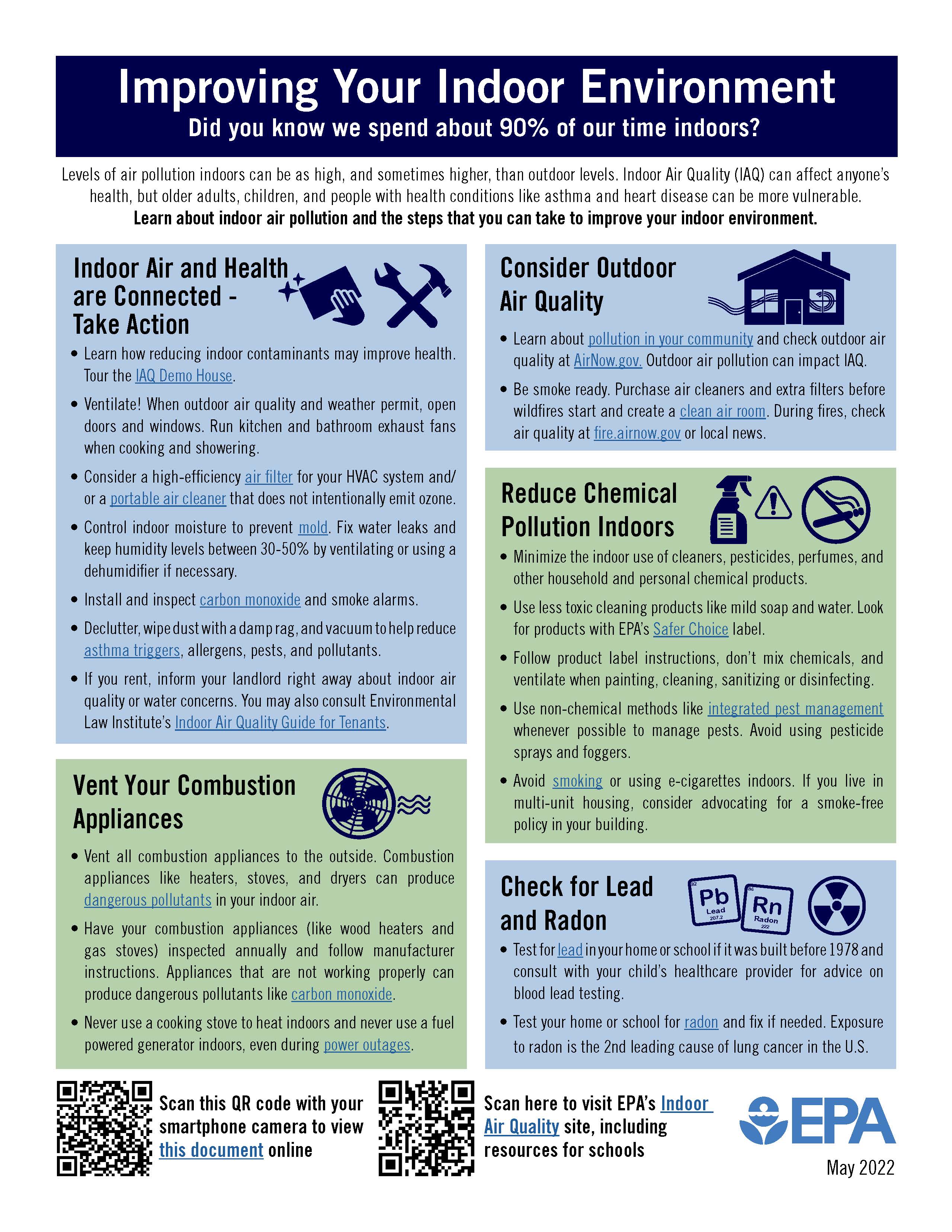Improving Your Indoor Environment
Did you know we spend about 90% of our time indoors? Indoor Air Quality (IAQ) affects everyone, especially those who may be more vulnerable - children, the elderly, and people with health conditions like asthma and heart disease.
This resource provides information about the most common types of IAQ concerns, and the steps you can take to address them.
Text Version of the Infographic
Improving Your Indoor Environment
Did you know we spend about 90% of our time indoors?
Levels of air pollution indoors can be as high, and sometimes higher, than outdoor levels. Indoor Air Quality (IAQ) can affect anyone’s health, but older adults, children, and people with health conditions like asthma and heart disease can be more vulnerable. Learn about indoor air pollution and the steps that you can take to improve your indoor environment.
Indoor Air and Health are Connected - Take Action
- Learn how reducing indoor contaminants may improve health. Tour the IAQ Demo House.
- Ventilate! When outdoor air quality and weather permit, open doors and windows. Run kitchen and bathroom exhaust fans when cooking and showering.
- Consider a high-efficiency air filter for your HVAC system and/ or a portable air cleaner that does not intentionally emit ozone.
- Control indoor moisture to prevent mold. Fix water leaks and keep humidity levels between 30-50% by ventilating or using a dehumidifier if necessary.
- Install and inspect carbon monoxide and smoke alarms.
- Declutter, wipe dust with a damp rag, and vacuum to help reduce asthma triggers, allergens, pests, and pollutants.
- If you rent, inform your landlord right away about indoor air quality or water concerns. You may also consult Environmental Law Institute’s Indoor Air Quality Guide for Tenants.
Vent Your Combustion Appliances
- Vent all combustion appliances to the outside. Combustion appliances like heaters, stoves, and dryers can produce dangerous pollutants in your indoor air.
- Have your combustion appliances (like wood heaters and gas stoves) inspected annually and follow manufacturer instructions. Appliances that are not working properly can produce dangerous pollutants like carbon monoxide.
- Never use a cooking stove to heat indoors and never use a fuel powered generator indoors, even during power outages.
Consider Outdoor Air Quality
- Learn about pollution in your community and check outdoor air quality at AirNow.gov. Outdoor air pollution can impact IAQ.
- Be smoke ready. Purchase air cleaners and extra filters before wildfires start and create a clean air room. During fires, check air quality at fire.airnow.gov or local news.
Reduce Chemical Pollution Indoors
- Minimize the indoor use of cleaners, pesticides, perfumes, and other household and personal chemical products.
- Use less toxic cleaning products like mild soap and water. Look for products with EPA’s Safer Choice label.
- Follow product label instructions, don’t mix chemicals, and ventilate when painting, cleaning, sanitizing or disinfecting.
- Use non-chemical methods like integrated pest management whenever possible to manage pests. Avoid using pesticide sprays and foggers.
- Avoid smoking or using e-cigarettes indoors. If you live in multi-unit housing, consider advocating for a smoke-free policy in your building.

